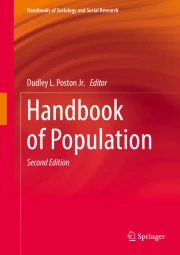
This is a preview of subscription content, log in via an institution to check access.
eBook EUR 192.59
Price includes VAT (France)Hardcover Book EUR 242.64
Price includes VAT (France)Tax calculation will be finalised at checkout
The 2 nd edition of the Handbook of Population covers the major topics of the discipline of demography, including current substantive, methodological and theoretical issues of interest, as well as new and emerging topics in the field. In addition to revised, updated and extended chapters that were included in the 1 st edition, this 2 nd edition of the Handbook brings to the forefront entirely new chapters covering such major themes as children, adoption, sexuality, inequality, population psychology, rural demography, and obesity. Chapters in this Handbook will expand our knowledge of the field, and will raise awareness of the causes and the consequences of demographic behavior and events in societies throughout the world. This 2 nd edition will also serve as a reference in the field of population studies for years to come. It will generate new questions and research ideas and will positively impact the growth, development, and expansion of demography.

“Demography is a dynamic field that is constantly evolving, which is why the 2005 edition of The Handbook of Population was such a welcome update to earlier summation prepared in 1959 by Philip Hauser and Dudley Duncan. The second edition of The Handbook is likewise a welcome addition to the literature given the rapid pace of change in demographic research today. Not only have earlier updates on new topics such as biodemography and political demography been expanded, the new edition also contains entirely new chapters on emerging issues of demographic interest such as obesity, inequality, and adoption. Editor Dudley Poston continues to provide a great service to the field by keeping demographers abreast of the latest developments in populationscience.” (Douglas S. Massey, Princeton, USA)
“The 2 nd edition of the Handbook of Population is a comprehensive overview of the interdisciplinary field of population studies with 34 substantive chapters written by 62 authors. This massive undertaking, which includes major revisions and updating of 27 chapters from the first edition plus seven original chapters on new topics (childhood, adoption, sexuality, inequality, population psychology, rural demography, and obesity). In addition to summarizing the theories, classical debates, empirical trends and patterns, and policy issues in an area, many of the chapters offer an original conceptualization of the organization of research on a topic or subfield. The volume was orchestrated by Dudley Poston, who was also an editor of the first edition. Poston offers a compelling vision of the evolution and breadth of demography in his prologue and authored two substantive chapters. Newcomers to demography—from graduate students to researchers in related fields—will find a thorough introduction to the many branches of population studies in this volume. It will also serve a valuable reference work for experienced researchers and specialists who are looking for the latest developments in fields other than their own and perhaps a new take on their own area of specialization.” (Charles Hirschman, University of Washington, USA)
Dudley L. Poston, Jr. is Professor of Sociology, and the George T. and Gladys H. Abell Professor of Liberal Arts, at Texas A&M University. He also holds the positions of Adjunct Professor of Demography at People’s University, Beijing, China; Adjunct Professor of Sociology at Fuzhou University, Fuzhou, China; and Adjunct Professor of Demography at Nanjing Normal University, Nanjing, China.
Dr. Poston joined the faculty of Texas A&M University in 1992, and served as the Head of the Department of Sociology from 1992 to 1997. He previously served on the Rural Sociology and Sociology faculties, respectively, of Cornell University (1988-1992), and The University of Texas at Austin (1970-1988), where he was also affiliated with the Population Research Center (University of Texas) and the Population and Development Program and the East Asia Studies Program (Cornell University). He was Chair of the Department of Rural Sociology at Cornell University from 1989 to 1992, and he was Director of the Population Research Center at the University of Texas at Austin from 1981 to 1986.
Dr. Poston served as President (2004-2005) of the Southwestern Social Science Association. He served (1995 through 1998) as the President of Research Committee 41 (Sociology of Population) of the International Sociological Association. He served (1995 through 1997) as President of the North American Chinese Sociologists Association. He served as President of the Southwestern Sociological Association in 1983-84. He served during 1975-1977 as the President of the Southern Demographic Association. He has been elected to membership in Alpha Kappa Delta (1964), Gamma Sigma Delta (1991), Phi Beta Delta (1993), Phi Kappa Phi (1999), and the Sociological Research Association (1984). And in 2014 he was elected a Fellow of the American Association for the Advancement of Science.